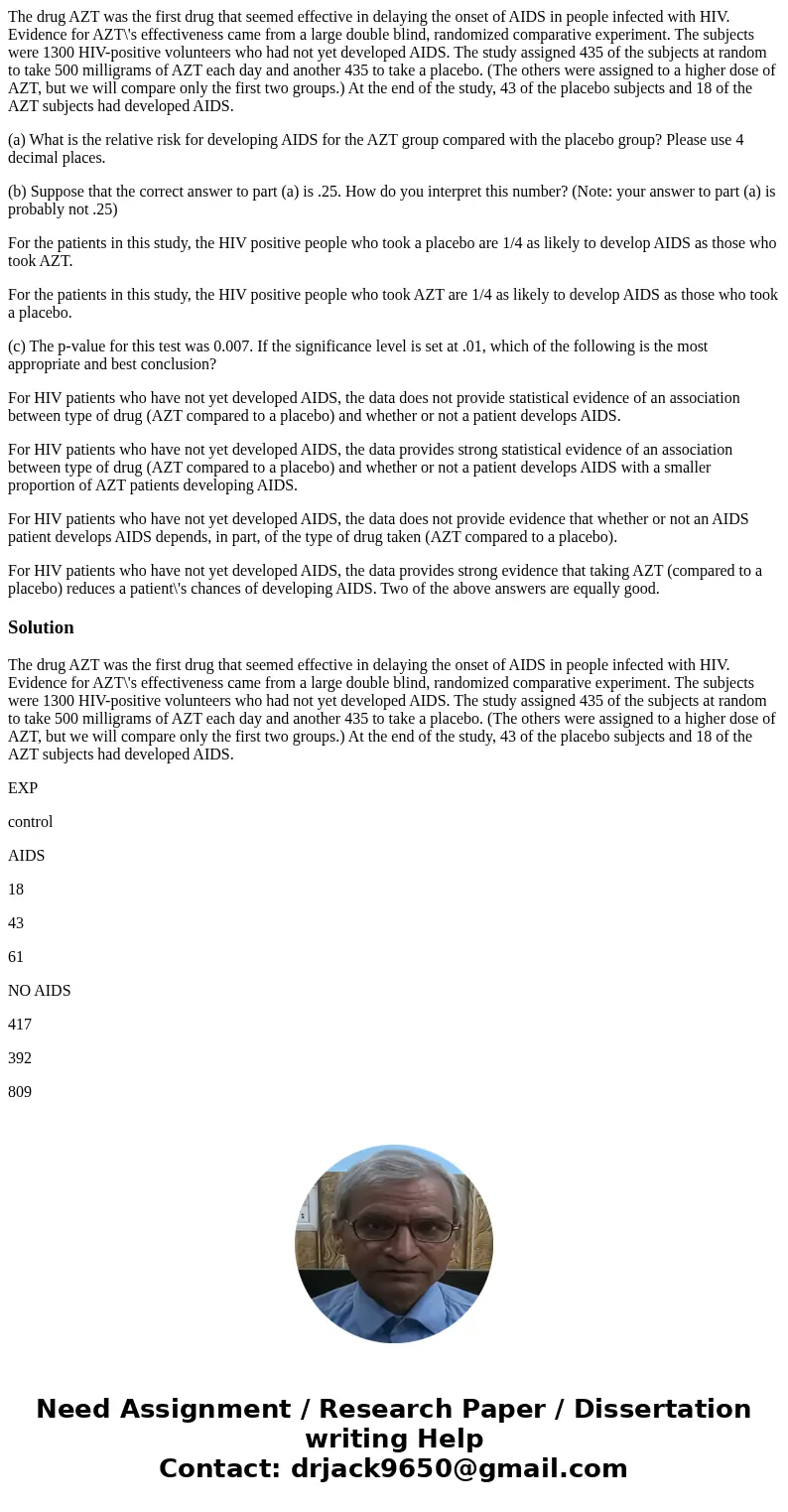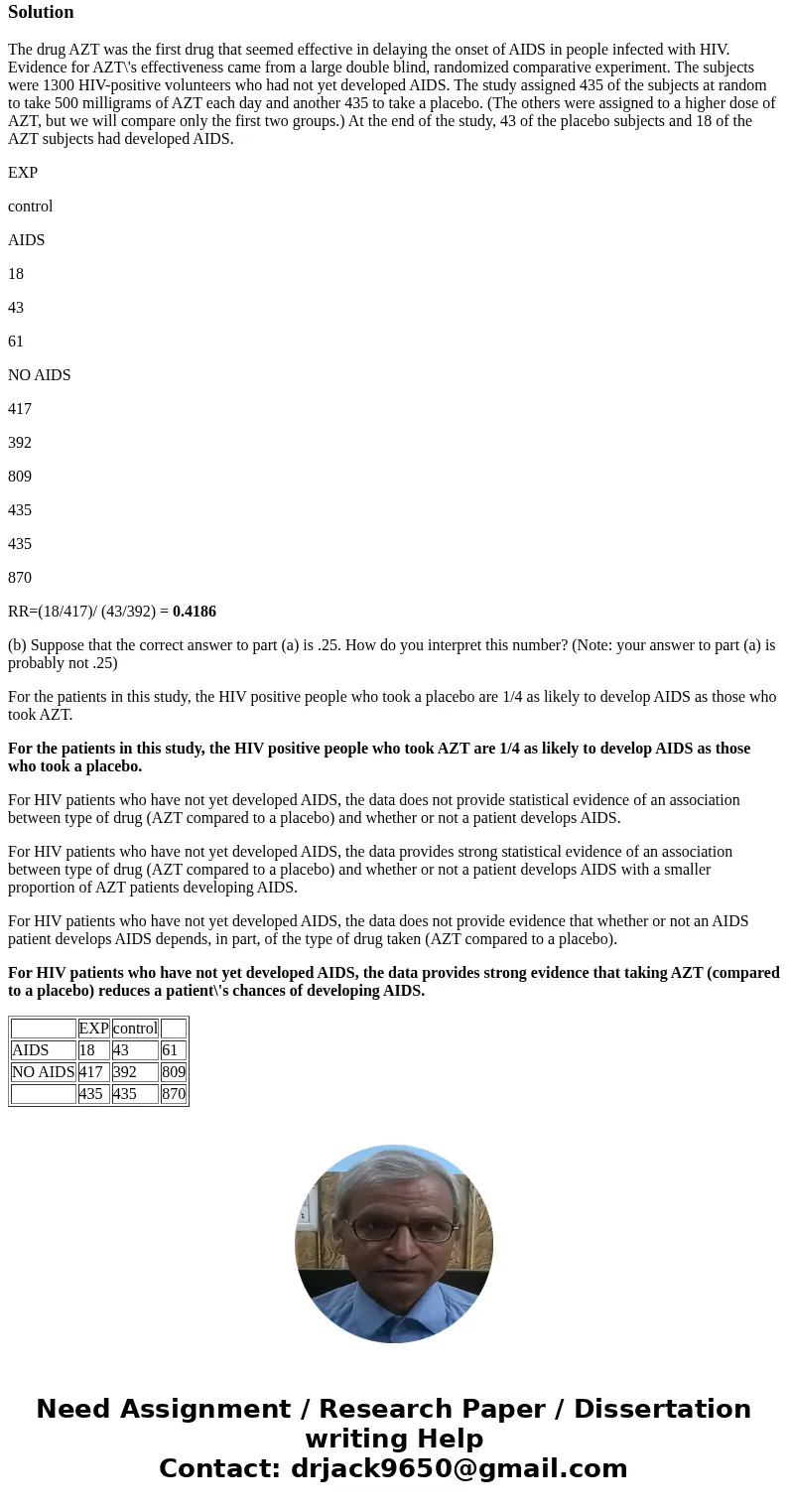The drug AZT was the first drug that seemed effective in del
The drug AZT was the first drug that seemed effective in delaying the onset of AIDS in people infected with HIV. Evidence for AZT\'s effectiveness came from a large double blind, randomized comparative experiment. The subjects were 1300 HIV-positive volunteers who had not yet developed AIDS. The study assigned 435 of the subjects at random to take 500 milligrams of AZT each day and another 435 to take a placebo. (The others were assigned to a higher dose of AZT, but we will compare only the first two groups.) At the end of the study, 43 of the placebo subjects and 18 of the AZT subjects had developed AIDS.
(a) What is the relative risk for developing AIDS for the AZT group compared with the placebo group? Please use 4 decimal places.
(b) Suppose that the correct answer to part (a) is .25. How do you interpret this number? (Note: your answer to part (a) is probably not .25)
For the patients in this study, the HIV positive people who took a placebo are 1/4 as likely to develop AIDS as those who took AZT.
For the patients in this study, the HIV positive people who took AZT are 1/4 as likely to develop AIDS as those who took a placebo.
(c) The p-value for this test was 0.007. If the significance level is set at .01, which of the following is the most appropriate and best conclusion?
For HIV patients who have not yet developed AIDS, the data does not provide statistical evidence of an association between type of drug (AZT compared to a placebo) and whether or not a patient develops AIDS.
For HIV patients who have not yet developed AIDS, the data provides strong statistical evidence of an association between type of drug (AZT compared to a placebo) and whether or not a patient develops AIDS with a smaller proportion of AZT patients developing AIDS.
For HIV patients who have not yet developed AIDS, the data does not provide evidence that whether or not an AIDS patient develops AIDS depends, in part, of the type of drug taken (AZT compared to a placebo).
For HIV patients who have not yet developed AIDS, the data provides strong evidence that taking AZT (compared to a placebo) reduces a patient\'s chances of developing AIDS. Two of the above answers are equally good.
Solution
The drug AZT was the first drug that seemed effective in delaying the onset of AIDS in people infected with HIV. Evidence for AZT\'s effectiveness came from a large double blind, randomized comparative experiment. The subjects were 1300 HIV-positive volunteers who had not yet developed AIDS. The study assigned 435 of the subjects at random to take 500 milligrams of AZT each day and another 435 to take a placebo. (The others were assigned to a higher dose of AZT, but we will compare only the first two groups.) At the end of the study, 43 of the placebo subjects and 18 of the AZT subjects had developed AIDS.
EXP
control
AIDS
18
43
61
NO AIDS
417
392
809
435
435
870
RR=(18/417)/ (43/392) = 0.4186
(b) Suppose that the correct answer to part (a) is .25. How do you interpret this number? (Note: your answer to part (a) is probably not .25)
For the patients in this study, the HIV positive people who took a placebo are 1/4 as likely to develop AIDS as those who took AZT.
For the patients in this study, the HIV positive people who took AZT are 1/4 as likely to develop AIDS as those who took a placebo.
For HIV patients who have not yet developed AIDS, the data does not provide statistical evidence of an association between type of drug (AZT compared to a placebo) and whether or not a patient develops AIDS.
For HIV patients who have not yet developed AIDS, the data provides strong statistical evidence of an association between type of drug (AZT compared to a placebo) and whether or not a patient develops AIDS with a smaller proportion of AZT patients developing AIDS.
For HIV patients who have not yet developed AIDS, the data does not provide evidence that whether or not an AIDS patient develops AIDS depends, in part, of the type of drug taken (AZT compared to a placebo).
For HIV patients who have not yet developed AIDS, the data provides strong evidence that taking AZT (compared to a placebo) reduces a patient\'s chances of developing AIDS.
| EXP | control | ||
| AIDS | 18 | 43 | 61 |
| NO AIDS | 417 | 392 | 809 |
| 435 | 435 | 870 |


 Homework Sourse
Homework Sourse